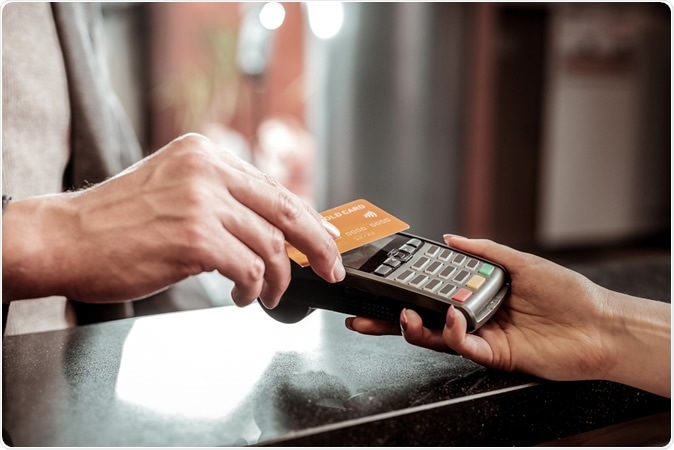The World Health Organization (WHO) has recommended people to avoid using currency notes to prevent the spread of the COVID-19 virus or the novel coronavirus that has caused a global panic infecting over ninety-thousand individuals and killing over 3,000 up until now.
The WHO says that it is a possibility that the COVID-19 virus could be spreading from an infected person to another via banknotes, and thus people should try and switch to cashless transactions as much as possible.
The WHO has recommended that where such cashless or contactless payments are not possible, people need to wash their hands immediately after handling money.

Contactless payment. Image credit: Shutterstock
Where did this come from?
The COVID-19 virus was first detected in December 2019, with the first cases identified in the Wuhan city of the Hubei province of China. With the rapid international spread of the virus and over three thousand deaths, there has been a worldwide attempt to curb the spread of this infection. China and Korea first started isolating, and disinfecting used banknotes to prevent the spread of the virus from an infected person to another. Bank of England and other nations have not yet followed suit. There have been 115 confirmed cases of COVID-19 infection in the United Kingdom, and one death say reports.
Advice
Money changes hands, say experts, and are likely to pick up bacteria as well as viruses from one person to another. Experts around the world suggest that when possible, handling soiled notes should be avoided, and hands should be washed thoroughly after handling such notes. After using the notes, the face and eyes should not be touched with unwashed hands, say experts. They also add that all surfaces, mobile phones, and other items of daily use are likely to be contaminated, and after using them, hands need to be washed thoroughly. Alcohol-based hand sanitizers should be used after handling potentially contaminated articles, the recommendations state. While coughing and sneezing, the mouth and nose should be covered, and the tissues discarded appropriately.
Experts
A spokesperson from the WHO said to The Telegraph, “We know that money changes hands frequently and can pick up all sorts of bacteria and viruses. We would advise people to wash their hands after handling banknotes and avoid touching their faces. When possible, it would also be advisable to use contactless payments to reduce the risk of transmission.”
Prime Minister Boris Johnson, at a press conference, said, “It is highly likely we will see a growing number of UK cases. Our country remains extremely well prepared, as it has been since the outbreak began in Wuhan several months ago.”
Chief Medical Officer Chris Witty said that the rate of infections has lowered, saying that in the UK, “probably around one percent of people who get this virus might end up dying.”
Some myths busted by the WHO
Some of the frequently asked questions regarding COVID-19 virus infection have been answered at the WHO website. Some of these include the efficacy of hand dryers or ultraviolet disinfection lamps used for sanitizing the hands. The WHO states that hand dryers are ineffective in killing the virus on the hands and that UV lamps could harm the skin more than killing the bacteria. Similarly, spraying alcohol over self or using chlorine can also not prevent the infection that has already entered the body, says the WHO. These sprays may cause damage to the skin and mucus membranes and eyes, they wrote. Also, regularly rinsing the nose with saline water or eating garlic or applying sesame oil is not protective against the COVID-19 infection, says the WHO.
One of the questions was if thermal scanners could help detect COVID-19 infection detection to which the WHO says that raised temperature could be an indicator of those with the infection and fever. Those without fever could go undetected, add the experts. Pets are as of now not confirmed to be carrying or spreading the disease, says the WHO. They, however, recommend that hands should be thoroughly washed after handling pets such as dogs and cats, not only to prevent viral transmission but also to bacterial transmissions such as E. coli and Salmonella.
The WHO says it is safe to receive a letter or parcel from China because the virus is unable to survive on objects for long. They added that at present, there are no vaccines to prevent COVID-19 infection, and those who are older with other health conditions such as asthma, diabetes, or heart disease are at a higher risk of getting infected. These populations are recommended to take the pneumococcal vaccine and Haemophilus influenza type B (Hib) vaccines that protect against pneumonia, say the experts. The WHO states that antibiotics are ineffective against the new coronavirus, and at present, there are no specific medications to prevent and treat the coronavirus infections.